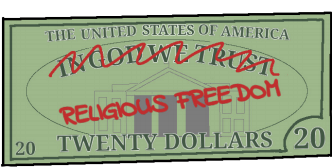

Constitutional challenges under the Free Exercise Clause are most successful if coupled with violations of an individual’s or group’s freedom of speech and freedom of association. Statutes are frequently deemed in violation of the free exercise clause if the law specifically mentions religious practice, when there are hints of anti-religious motivation, or when the law affects religious practice alone. The government regulates conduct of all sorts, but for the government to restrict the free exercise of one’s religion, the restriction must be a neutral conduct restriction generally applicable to all of society, and it must not restrict the exercise of other related constitutional freedoms. The freedom to act upon religious or other strongly held convictions is not unlimited.

Thus, believers and nonbelievers alike are protected from any unreasonable governmental infringements upon their freedom of conscience. The closely held beliefs of citizens, even beliefs that are not rooted in official religious doctrine, are protected. Protections under the Free Exercise Clause are not exclusive to religious individuals or to official doctrines.

“Congress shall make no law respecting an establishment of religion or prohibiting the free exercise thereof … ”


 0 kommentar(er)
0 kommentar(er)
